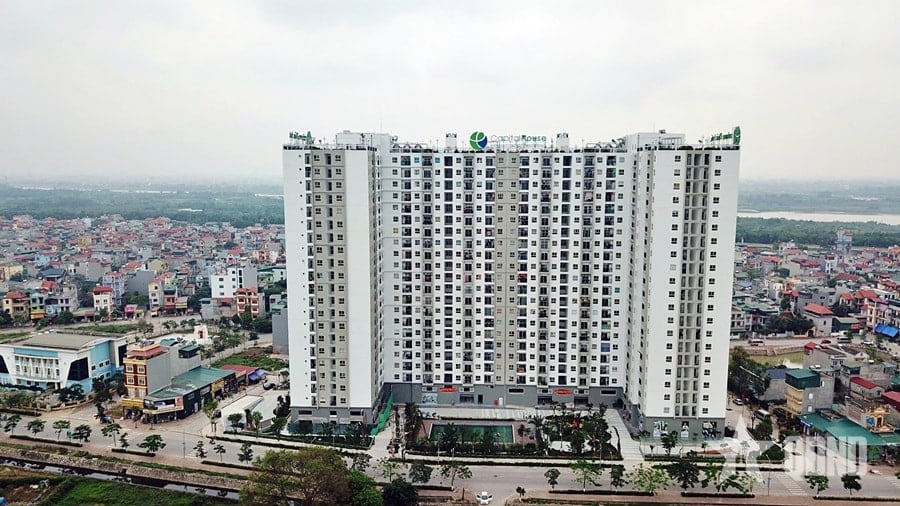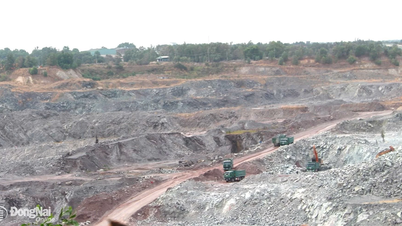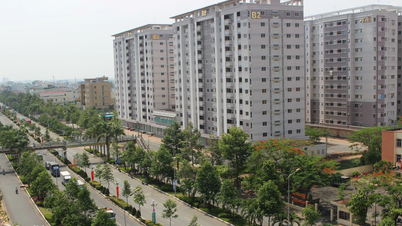When supply and demand have not "met" each other
According to a survey by the authorities, the demand for housing among workers, especially young people in major cities across the country, is currently very high. Ho Chi Minh City has a population of about 14 million people, and the demand for social housing from now until 2030 is about 850,000 apartments. To solve this problem, the Government has assigned Ho Chi Minh City to build 100,000 apartments as part of a program to build 1 million social housing apartments from now until 2030. However, that number only meets part of the housing demand in this city. In reality, according to Mr. Le Hoang Chau, Chairman of the Ho Chi Minh City Real Estate Association, the number of social housing in the city is only about 6,000 units.
In Hanoi , after 4 years of implementing the project to build 1 million social housing apartments, the city has only handed over 13 projects, of which 10 projects are fully completed and 3 projects are partially completed with about 11,300 apartments. Meanwhile, according to experts' calculations, each year Hanoi adds 120,000 new households, meaning the number of new apartments to meet the needs of families also increases significantly.
 |
| Social housing project for low-income people in Long Bien district, Hanoi. Photo: TUAN HUY |
The demand for housing in large cities is constantly increasing, while the supply of real estate is always in a state of "shortage before shortage after shortage", leading to the price of housing (both social housing and commercial housing) being continuously set at a new level by sellers. On the other hand, there are no sanctions to identify and handle the behavior of speculation and price inflation of apartments by parties participating in buying and selling transactions according to the principle of "willing buyer, willing seller".
Having difficulty finding an apartment that fits her current financial resources, Ms. Nguyen Thi Van Anh, 32 years old, a sales employee at a company in Hanoi, said: “We have more than 1 billion VND in finance, so we intend to buy an apartment worth more than 2 billion VND to have a basis for paying off the debt. However, since the end of 2024, the prices of apartment buildings have increased rapidly. With the amount of money we calculated, it is almost impossible to access any apartment. If we buy an apartment worth about 3.5 billion VND, with the total income of 30 million VND/month of the couple, it will be very difficult for us to shoulder the debt of more than 2 billion VND. Not to mention, the interest rate of bank loans for home purchase support packages often floats after the first one to two years of incentives."
In big cities, apartments are invested in construction in 3 segments: High-end, mid-range and secondary. In fact, the average price of secondary apartments in Hanoi and Ho Chi Minh City is at 70-80 million VND/m², while apartments priced under 50 million VND/m² appear very rarely on the real estate trading floor. Thus, with the average income of workers of 15-25 million VND/month, buying an apartment priced at 3-5 billion VND is almost impossible without support from preferential loan packages or support from family and relatives.
Need drastic and synchronous solutions
In order for low-income people and young people to be able to own a social house or a cheap commercial house, recently, the Government and central ministries and branches have had many specific and practical policies and guidelines. For example, in early March 2025, the Government held a conference to remove difficulties and obstacles, and promote the development of social housing. At the conference, Prime Minister Pham Minh Chinh assigned the Ministry of Construction to study and propose the establishment of a National Housing Fund; directed ministries and branches to continue to study and propose more effective support mechanisms and policies for the development of social housing, and at the same time complete the targets in the Project "Investing in the construction of at least 1 million social housing apartments for low-income people and industrial park workers in the period 2021-2030".
Accompanying young people to overcome financial difficulties, Asia Commercial Joint Stock Bank (ACB) has pioneered in announcing the “First Home” loan package. This loan package is for people under 35 years old, with preferential interest rates from 5.5%/year, and loan terms can last up to 30 years. In particular, customers can flexibly repay the debt with a small amount in the first years, then gradually increase according to income - an approach that is very suitable for the personal financial development roadmap of young people.
Regarding the issue of removing difficulties for low-income workers and young people to have the opportunity to own a house, Mr. Nguyen Duc Lenh, Deputy Director of the State Bank, Branch Region II, said that developing the affordable housing segment is the solution to the problem of housing costs in the context of limited income of workers. Along with that, increasing the implementation of preferential credit packages for low-income people and young people such as low interest rates, long loan terms, creating conditions for young people to easily access home ownership.
Agreeing with the Government's policies and practices, at the recent "Real Estate: Housing for Young People" Seminar organized by the Laborer Newspaper in collaboration with the Vietnam Real Estate Association, many experts said that expanding financial support and preferential loan packages with reasonable lending policies, extending the repayment period from 20 years to 25-40 years is one of the important solutions to help low-income workers and young people reduce monthly financial pressure.
However, according to comrade Ngo Duy Hieu, Vice President of the Vietnam General Confederation of Labor , along with financial support, the core issue that plays an important role is that the Government must have drastic solutions and measures in directing and implementing the development of social housing projects and low-cost commercial housing, suitable for the income of workers and young people. Along with that, the authorities need to have leverage policies for businesses such as supporting investment procedures, simplifying administrative procedures, shortening project approval time, etc.
Commenting on policies to facilitate workers, especially young people, to buy houses, experts agree that there needs to be a simultaneous coordination between state policies, bank interest rates and the participation of investors (enterprises). A product with a reasonable price, a longer-term lending policy, with stable preferential interest rates maintained for 10-20 years will be strategic changes. Only then can home buyers truly benefit and effectively support the real estate market. However, along with support mechanisms and policies, there also needs to be a mechanism to strictly control home buyers, ensuring that policies reach the right people, the right objects, and avoid exploitation.
VAN ANH
*Please visit the Society section to see related news and articles.
Source: https://baodaknong.vn/co-hoi-nao-cho-nguoi-lao-dong-mua-nha-249782.html




![[Photo] Many young people patiently lined up under the hot sun to receive a special supplement from Nhan Dan Newspaper.](https://vphoto.vietnam.vn/thumb/1200x675/vietnam/resource/IMAGE/2025/5/18/6f19d322f9364f0ebb6fbfe9377842d3)

![[Photo] Party and State leaders attend the special art program "You are Ho Chi Minh"](https://vphoto.vietnam.vn/thumb/1200x675/vietnam/resource/IMAGE/2025/5/18/6895913f94fd4c51aa4564ab14c3f250)
![[Photo] Ready for the top competitions of Vietnamese table tennis](https://vphoto.vietnam.vn/thumb/1200x675/vietnam/resource/IMAGE/2025/5/18/9c547c497c5a4ade8f98c8e7d44f5a41)















































































Comment (0)